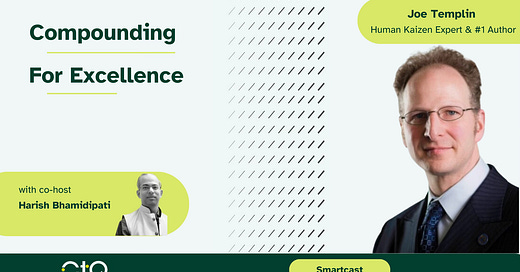Welcome Uplevelers!
In today’s newsletter, we distill the wisdom from our podcast conversation with Joe Templin - author, ultramarathoner, martial arts champion, and the “Human Kaizen Expert.” Joe’s journey and philosophy offer actionable insights for anyone seeking to build future relevance through habits, compounding, and continuous improvement. Whether you’re an individual striving for personal mastery or a leader aiming to uplevel your team, this is your playbook for everyday excellence.
The Power of Habits: Why Small Actions Matter
Habits as the Foundation of Excellence
Joe likens habits to dominoes: one good habit sets up the next, creating a chain reaction of success.
Professional athletes, from cricketers to martial artists, rely on pre-game rituals to achieve a state of flow and consistent performance.
The key is to find routines that work for you and stick with them until they become second nature.
Emotional Connection Fuels Lasting Change
Habits that stick are those with emotional significance. If a lesson hurts or embarrasses, it’s remembered—and improved upon.
Externally imposed goals fade; internally driven ones endure. Your “why” must be strong enough to carry you through the “how”.
Compounding: The Secret to Nonlinear Growth
What Is Compounding in Personal Growth?
Compounding isn’t just for finance. Small, consistent actions—reading, learning, practicing—accumulate over time, leading to exponential improvement.
Joe’s own “reading compound” at CTQ hit 1,500 days of daily reading, demonstrating the power of sustained, collective effort.
Making Compounding Tangible
Visualize progress: track your 1% improvements over months and years to see the dramatic difference.
Use physical analogies (like adding pennies to a bowl) to make the concept of compounding real and motivating for your team.
Identity, Motivation, and the Role of Emotion
Identity-Based Habits
Change is easier when it aligns with your desired identity: “I am a runner,” “I am a learner,” “I am a leader.”
Community challenges, like “Run the Year,” leverage identity and group accountability to drive sustained action.
Emotional Reinforcers
Tie your goals to something deeply meaningful—family, personal pride, or a cause.
Joe shares how promising his son a trip to Disney World for hitting a book sales goal kept him motivated through tough days.
Habit Stacking and Environment Design
Link new habits to existing routines: after waking up, read a page; after coffee, write for 10 minutes; after a workout, reflect or journal.
Prepare your environment in advance (e.g., set up the coffee pot the night before) to reduce friction and increase follow-through.
Identify and eliminate cues that lead to bad habits—uninstall distracting apps, avoid unhelpful company, and design your day for positive momentum.
Reflection, Feedback, and Continuous Improvement
Keep score: measure your calls, workouts, or learning sessions to identify patterns and areas for improvement.
Regular reflection—through journaling or peer feedback—solidifies learning and helps you course-correct.
Surround yourself with people who will tell you the truth, not just what you want to hear. Tough love from friends, coaches, or mentors is essential for growth.
From Individual to Organizational Excellence
Rituals and Culture
Organizations can apply the same principles: build rituals (morning huddles, learning sprints), reward progress, and align work with individual strengths and rhythms.
Recognize and celebrate small wins—ice cream Thursdays, public shoutouts, or badges—to reinforce desired behaviors.
Customization and Flexibility
Allow for mass customization: set broad structures but personalize for individual work styles and peak performance times.
Leaders should model vulnerability and openness to learning, breaking down hierarchy and fostering authentic connections.
The 1% Rule
Small daily improvements may seem insignificant, but over time, they lead to massive transformation.
Make progress visible and experiential—use charts, physical tokens, or team challenges to keep motivation high.
Final Word: Excellence Is a Journey, Not a Destination
Joe’s philosophy is clear: “Excellence, as opposed to convenience.” Whether you’re running a marathon, writing a book, or building a future-ready team, the path is the same—break big goals into small, daily actions, stack your habits, reflect, and keep compounding. There is no finish line—just the next level to unlock.
“Every single day, you either get a little bit better or a little bit worse. Four or five micro-choices every day, and you’ve got that 1% improvement. That’s how you build excellence.”
Stay curious, keep compounding, and be excellent—every day.
Ready to uplevel your habits? Check our Goal Setting & Achievement ebook.




